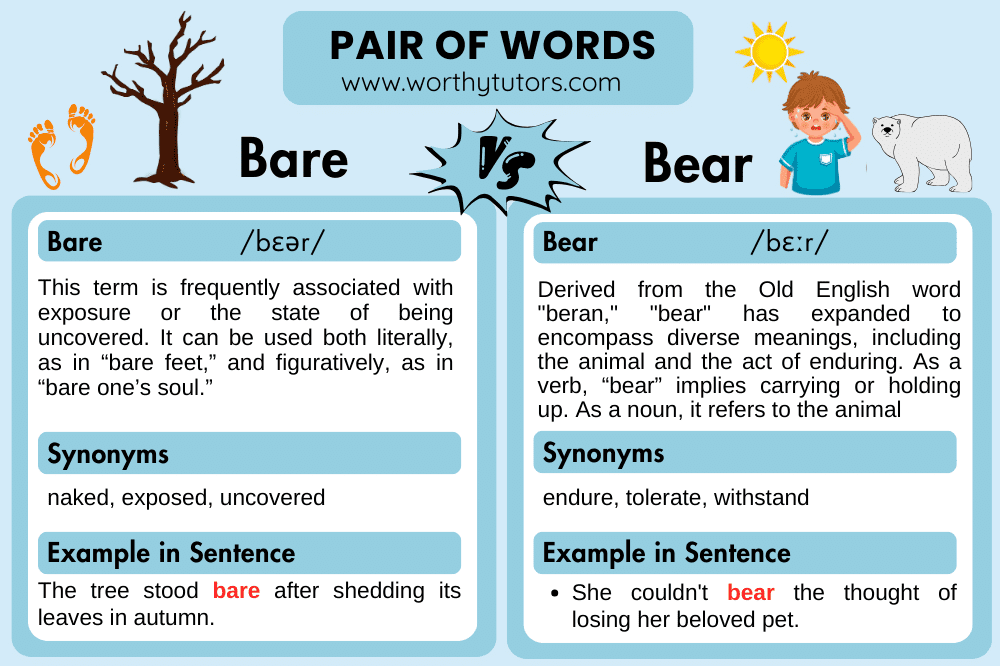
Differences Between “Bare” and “Bear”
The English language is riddled with homophones, words that sound alike but have different meanings. Among these, “bare” and “bear” stand out as a common source of confusion, particularly for students and non-native speakers. Their similar pronunciation often leads to misuse and misunderstanding. Let’s learn the basic differences between these two words to ensure clarity in communication.
Bare
Pronunciation of Bare
Pronounced as /bɛər/, with a single syllable.
Meanings of Bare
“Bare” typically means uncovered or naked. It denotes a lack of clothing or covering, as well as an absence of embellishment or decoration.
Synonyms of Bare
Synonyms include naked, exposed, uncovered, and minimal.
Etymology and explanation of Bare
Originating from the Old English word “bar,” meaning uncovered or exposed, “bare” has evolved to encompass various meanings related to lack or minimalism.
This term is frequently associated with exposure, or the state of being uncovered. It can be used both literally, as in “bare feet,” and figuratively, as in “bare one’s soul.”
Examples of Bare in sentences
- She walked barefoot on the sandy beach.
- The tree stood bare after shedding its leaves in autumn.
- His confession laid bare the truth of the situation.
- He decided to bare his feelings and tell her the truth.
- The report laid bare the facts for everyone to see.
Bear
Pronunciation of Bear
Pronounced as /bɛːr/, with a single syllable.
Meaning of Bear
“Bear” can refer to the large mammal of the family Ursidae, but it also has other meanings. It can denote to carry, endure, support, or tolerate something.
Etymology and explanation of Bear
Derived from the Old English word “beran,” meaning to carry, “bear” has expanded to encompass diverse meanings, including the animal and the act of enduring or supporting. As a verb, “bear” implies carrying or holding up. As a noun, it refers to the animal. The term is versatile and appears in numerous idiomatic expressions, such as “bear with me.”
Synonyms of Bear
Synonyms include endure, tolerate, withstand, carry, and support.
Example of Bear in sentences
- She couldn’t bear the thought of losing her beloved pet.
- He had to bear the consequences of his actions.
- The tree can bear fruit only if it’s well taken care of.
- He couldn’t bear the thought of losing her.
- In the forest, they saw a bear roaming near the stream.
Key Differences Between “Bare” and “Bear”
While “bare” refers to being uncovered or minimal, “bear” can mean to endure or carry a burden. Additionally, “bear” can also refer to the animal of the same name. The distinction lies in their usage and context within sentences.
Fill in the Blank Exercise
- I can’t ________ the thought of being alone in the wilderness.
- The ________ tree stood tall against the backdrop of the forest.
- She prefers to ________ her emotions rather than express them openly.
- The ________ truth was finally revealed.

About Authoress
Mahnoor Jehangir is a seasoned educator and linguist, specializing in English language and literature. With a master’s degree in English and applied linguistics, Mahnoor serves as a subject lead, while also indulging her passion for writing, exploring the nuances of language and storytelling.